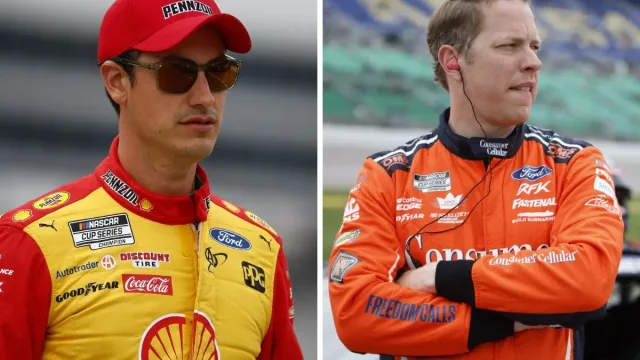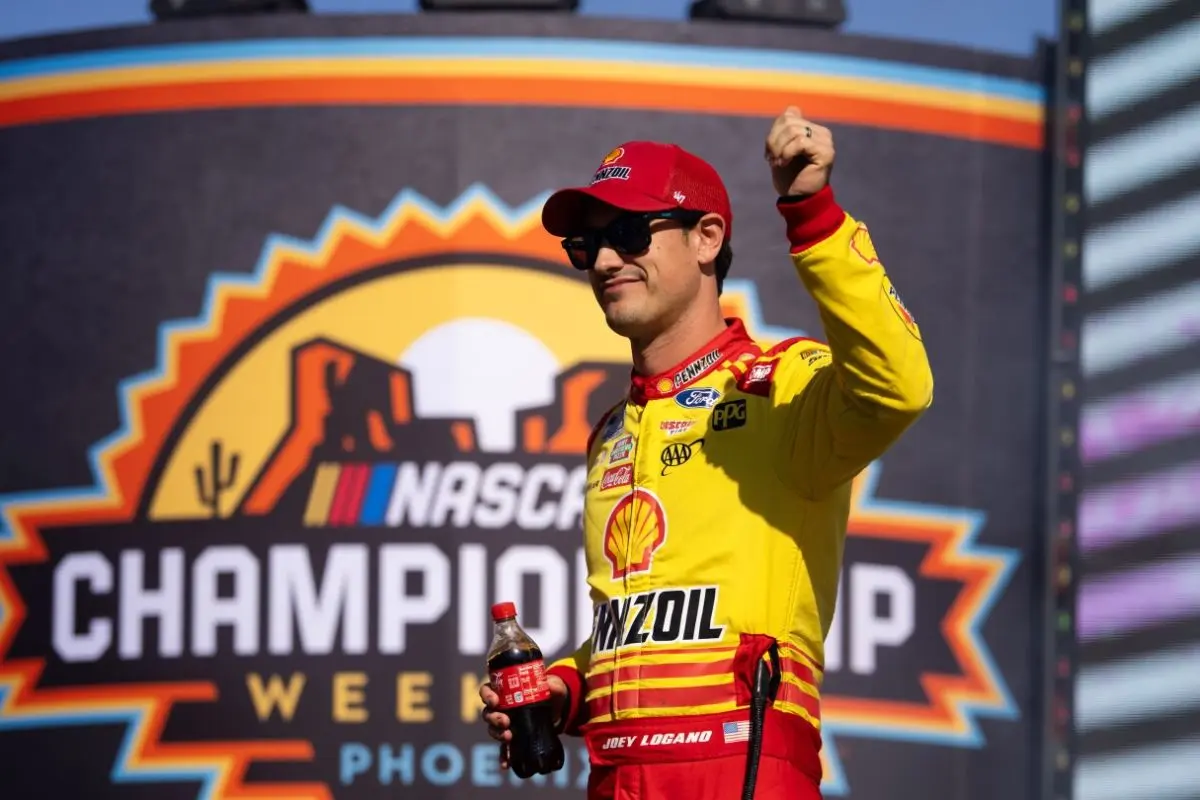Brad Keselowski Calls Out Flaws in NASCAR: Brad Keselowski has raised concerns about the integrity of NASCAR’s playoff system following Joey Logano’s championship win. While acknowledging Logano’s skill, Keselowski criticizes the playoff format for prioritizing single wins and favorable circumstances over consistent performance. He points out that the reset of points after 28 races can undermine merit, resulting in unpredictable outcomes that may favor luck over skill.
Key Highlights
- Brad Keselowski critiques the NASCAR playoff format, stating it allows for a single win to determine championship outcomes, undermining overall performance consistency.
- He acknowledges Joey Logano’s title win, but emphasizes that it was influenced by favorable circumstances rather than a season-long merit.
- Keselowski points to Alex Bowman’s disqualification as an example of the unpredictability inherent in the current playoff system.
- He expresses concern that the format compromises the integrity of NASCAR’s championship process and may diminish the value of consistent excellence.
- The debate centers on balancing the excitement generated by the playoff system with the need for a merit-based competitive structure.
Joey Logano’s Championship Win and the Playoff Format Debate
In the midst of the celebration of Joey Logano’s championship victory, the NASCAR community finds itself engaged in a critical examination of the playoff format. Logano’s triumph, his third consecutive title since the introduction of Next Gen cars, has reignited discussions surrounding the meritocratic nature of the current system.
Critics argue that the resetting of points after 28 races diminishes the value of consistent performance throughout the regular season. This reset allows drivers to qualify for the playoff rounds with minimal achievements, such as securing a single win, which raises questions about the integrity of championship qualifications.
The debate centers on whether the playoff format appropriately rewards excellence over the entirety of the season. While Logano and Team Penske have adeptly navigated this structure, showcasing tactical skill, the concern remains that under the current system, a driver with inferior general performance could potentially outpace a more deserving competitor.
The sentiment among some fans is that the excitement generated by the playoffs comes at the cost of fairness, as long-term consistency appears to be overshadowed by a singular moment of victory.
As the NASCAR community reflects on Logano’s achievement, it is crucial to contemplate how the playoff format influences the sport’s competitive landscape. The contrasting of Logano’s success against the backdrop of these criticisms presents a compelling case for re-evaluating the rules that govern NASCAR’s championship process, ensuring that they align with the principles of sporting excellence and integrity.
Brad Keselowski’s View
The complexity of NASCAR’s playoff system has prompted a nuanced assessment from veteran driver Brad Keselowski, who acknowledges both the merit of Joey Logano’s championship victory and the inherent flaws within the current format.
In his analysis, Keselowski articulates a duality: Logano’s success is valid, yet the mechanisms that facilitated it raise considerable concerns. Logano’s expedition to the title, marked by a single win at Nashville and subsequent fortuitous events, showcases how the playoff structure can reward luck as much as skill.
Keselowski’s stance is notable; he emphasizes that “two things can be true at the same time.” While Logano’s championship is deserved based on his performance in critical moments, the system itself fails to consistently reflect the best drivers over the season.
“2 things can be true at the same time- Joey Logano deserved to win the championship; This format doesn’t feel ideal for rewarding the NASCAR cup championship.” – Brad Keselowski
5). I’m not looking back wondering what would’ve been if I stayed at Team Penske. Success as a driver owner, even if less as of today, means so much more to me.
— Brad Keselowski (@keselowski) November 11, 2024
The disqualification of Alex Bowman at the Roval allowed Logano’s entry into the Round of 8, an event Keselowski suggests exemplifies the unpredictability inherent in the current system.
Keselowski’s insights reveal a broader concern for the integrity of NASCAR’s championship process. As the debate continues, it becomes clear that while the playoff system can produce exhilarating narratives, it may also undermine the enduring principles of competitive meritocracy that the sport aspires to uphold.
Joey Logano’s Perspective on Playoff Criticism
Joey Logano’s championship victory at Phoenix has elicited a range of responses, yet he stands firmly in favor of NASCAR’s playoff format. His endorsement of the current structure reflects a belief that it amplifies the excitement and competitiveness of the sport. Logano highlights the unique thrill that the “win-and-you’re-in” rule brings, nurturing compelling narratives throughout the season.
Logano identifies several key elements that showcase the strengths of NASCAR’s playoff system:
- Dramatic Tension: The format creates do-or-die moments that keep both drivers and fans on the edge of their seats.
- Dynamic Storylines: Each race contributes to evolving narratives, adding layers of intrigue to the championship chase.
- Increased Stakes: The pressure intensifies as only a select number of drivers advance, promoting a highly competitive environment.
- Fan Engagement: The playoff structure appeals to diverse audiences, drawing in viewers with varied interests in strategy and outcomes.
He articulated, “Do you want to see the championship crown with three races to go? That’s pretty boring.”
The Polarizing Nature of NASCAR’s Playoff Format
NASCAR’s playoff format has emerged as a contentious topic within the racing community, eliciting a spectrum of opinions from fans and analysts alike. While the format generates considerable excitement and offers intense moments of “do-or-die” racing, it has also sparked criticism for its unpredictability, which some argue undermines the core of merit-based competition. This duality raises a crucial question: do fans genuinely favor the current structure, or is there a desire for reform?
“You get do or die moments; you got the pressure; you got all these things going on in the last 10 weeks. You have guys trying to get into the playoffs; you have that storyline. Gosh, how many storylines can we make? It’s amazing, right? For people to complain, it makes me mad; it makes me so frustrated to hear that.” – Joey Logano
As the NASCAR community continues to grapple with these contrasting views, the debate remains unresolved. Proponents argue that the thrill of the playoffs is vital for drawing in viewership, while detractors claim that the system can lead to scenarios where deserving drivers are eliminated due to chance rather than skill.
Ultimately, the future of NASCAR’s playoff format hinges on whether it can strike a balance that maintains excitement while preserving the integrity of competition, ensuring that all voices within the community are heard in the ongoing conversation.
News in Brief: Brad Keselowski Calls Out Flaws in NASCAR
The recent championship victory of Joey Logano has reignited critical discussions surrounding NASCAR’s playoff format, as highlighted by Brad Keselowski’s assertions regarding its inherent flaws. This debate emphasizes the complexities and polarizing nature of the current system, raising questions about fairness and competitiveness.
While some drivers welcome the structure, others express concerns regarding its implications for the sport. Ultimately, ongoing discourse is vital for evaluating the effectiveness and integrity of NASCAR’s playoff system in promoting equitable competition.
ALSO READ: Brad Keselowski Eyeing a Huge Win After 23XI Racing’s Legal Setback?



